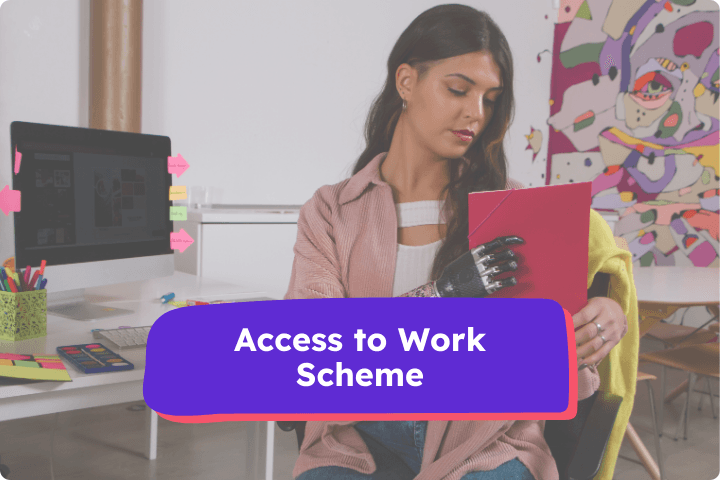All Articles
12 min read
How to Apply for Access to Work – Disabled People in Work
Written by
Georgina, Founder of Purpl
Published on
December 16, 2024

Hi, I’m Georgina, founder of Purpl Disabled Discounts. As a business owner and a disabled worker, I want to share with you the benefits of the Access to Work Scheme and a guide to how to apply for Access to Work. This is part of our series of guides for disabled people in the UK to explain how to make the most out of the available support. If there is an area you’d like us to look into and cover, then please let us know, you can email us at [email protected].

In This Article
- What is the Access to Work Scheme?
- What Types of Support are Available from Access to Work?
- Who is Eligible for Access to Work?
- Access to Work Application Process
- After You Have Applied for Access to Work
- Access to Work Workplace Assessment
- Decision and Funding Agreement
- How Much Money Does Access to Work Give You?
- Implementation of Support
- What If I Disagree with the Access to Work Decision?
- Reporting a Change in Circumstances
- Renewing your Access to Work Grant
- Summary
- Frequently Asked Questions
What is the Access to Work Scheme?
Access to Work (AtW) is a government initiative that offers practical and financial support for disabled people who face workplace barriers due to their health conditions or impairments. It helps cover costs associated with adjustments or support that are beyond what employers are required to provide as reasonable adjustments under the Equality Act 2010.
The application process can take a few weeks, depending on the complexity of your needs and the time required for assessment and decision-making. The DWP say ‘The average timescale for an Access to Work application to have a decision is 43.9 days’ but disabled people in the UK are claiming they are waiting over 200 days (September 2024).
Some of our members have told us that the DWP informed them that they will be contacted about their application within 24 weeks (168 days). So please be prepared to wait if you are about to apply for Access to Work.
What Types of Support are Available from Access to Work?
Access to Work funds equipment and adaptations to help disabled individuals perform their job effectively. This support goes beyond the employer’s legal obligations under the Equality Act 2010.
The type of equipment you can get access to includes:
- Assistive Technology: Software like screen readers, dictation tools, or speech-to-text programs for people with visual or learning difficulties
- Ergonomic Furniture: Adjustable desks, chairs, or keyboards for individuals with musculoskeletal conditions
- Specialised Tools: Adapted machinery or tools for manual work
- Communication Devices: Equipment for individuals with speech impairments
Support Workers
A support worker can provide personal assistance to enable the individual to perform their job effectively. This is especially valuable for individuals with visual impairments, hearing impairments, or learning disabilities.
- Sign Language Interpreters: For deaf or hearing-impaired individuals in meetings or client interactions
- Job Coaches: Assisting individuals with learning disabilities to understand and complete tasks
- Personal Assistants: Helping with tasks like reading documents, completing forms, or navigating the workplace
Travel Costs
Access to Work helps cover travel expenses if public transport is not accessible or suitable due to the disability or health condition.
- Taxis: If an individual cannot use public transport because of their condition
- Adapted Vehicles: Assistance with the cost of vehicle modifications
- Driver Support: Paying for a driver if the individual cannot drive themselves due to their condition
Mental Health Support
Access to Work offers a Mental Health Support Service, which provides tailored assistance for individuals experiencing mental health difficulties in the workplace.
- Confidential support from trained professionals
- Training to help developing coping mechanisms and workplace strategies
- Working with employers to make adjustments and improve understanding
Workplace Adjustments
The scheme can recommend or fund changes to the physical or operational setup of a workplace to make it more accessible. This may include:
- Installing wheelchair ramps or widening doorways
- Improving lighting for visually impaired employees
- Providing a quiet space for individuals with sensory sensitivities or anxiety
Communication Support
Specialist communication tools or services can be funded to ensure individuals can fully participate in the workplace. This may include:
- Real-time captioning for meetings
- Note-taking services for individuals with hearing impairments
- Training for colleagues to use inclusive communication techniques
Training for Assistive Technology
Access to Work can cover training costs to ensure individuals can effectively use any assistive technology provided. This may include:
- Training on screen-reading software like JAWS or NVDA
- Guidance on using speech-to-text systems
- Coaching on ergonomic equipment usage
Support for Starting a New Job or Returning to Work
If you are starting a new job or returning to work after a period of absence, Access to Work can help with necessary adjustments or transitional support, this may include:
- Funding for a temporary support worker during onboarding
- Providing job-specific assistive equipment from day one
- Tailored mental health support to ease the transition back to work

Who is Eligible for Access to Work?
Access to Work is open to anyone over 16 years old who has a health condition or disability affecting their ability to work. Eligibility for the Access to Work scheme is based on a combination of personal circumstances, employment status, and the nature of your disability or health condition.
As part of Access to Work, you may be able to get:
- support with managing your mental health at work
- a grant to help pay for practical support with your work
To be eligible for these types of support, you must:
- have a physical or mental health condition or disability that means you need support to do your job or get to and from work
- be 16 or over
- be in paid work (or be about to start or return to paid work in the next 12 weeks)
- live and work (or be about to start or return to work) in England, Scotland or Wales
Northern Ireland has a separate system, so you would need to check eligibility through its equivalent support program.
Your Disability, Illness or Health Condition
To qualify for Access to Work you must have a disability, illness or health condition that means you need support to do your job. You do not need to be diagnosed with a condition to apply as long as you meet one of the criteria:
- you have a physical disability, e.g. if you are hard of hearing or use a wheelchair
- you have a learning disability or related condition
- you have a developmental condition, like autism spectrum disorder
- you have ADHD or dyslexia
- you have an illness such as diabetes or epilepsy
- you have a temporary condition, like a broken leg
- you have a mental health condition, e.g. anxiety or depression
Employment Status
You will be eligible for Access to Work you need to have a paid job (or be about to start or return to one). Please note you cannot apply for Access to Work if you are doing a voluntary job. You must have a contract of employment and be paid at least the National Minimum Wage.
A paid job can be full or part-time and can include:
- employment
- self-employment
- a apprenticeship
- a work trial or work experience
- a internship
- a work placement
Income and Benefits Status
Access to Work is not means-tested so you can be eligible regardless of how much you earn or how much money you have in savings.
You can also get Access to Work at the same time as some benefits as long as you work for more than 1 hour per week. There are however some benefits which exclude you from being eligible – please see below.
Exceptions
If you receive any of the following benefits you may not be eligible for Access to Work:
- Incapacity Benefit
- Employment and Support Allowance
- Severe Disablement Allowance
- Income Support
- National Insurance credits
However, you may be able to receive it for a limited time if you are doing certain types of ‘Permitted Work’ to help you move off benefits completely.

Access to Work Application Process
To apply for Access to Work you will need to provide the following information, make sure you have this ready before you start the application process:
- your contact details
- your workplace address and postcode
- information on how your condition affects your work and what support you think you will need
- details of a workplace contact who can confirm you work there, if you’re employed (they will not be contacted without your permission)
- if you are self-employed you will need your Unique Taxpayer Reference (UTR) number
To apply online via the official UK government website for Access to Work and complete the application form.
To apply by telephone or to get further support, please call the Access to Work helpline (Monday to Friday, 9am to 5pm):
- Telephone: 0800 121 7479
- Textphone: 0800 121 7579
- Relay UK (if you can’t hear or speak on the phone): 18001 0800 121 7479
Once your application is submitted, you will be contacted by an Access to Work advisor. This could be by phone or email.
After You Have Applied for Access to Work
After you have completed the application form for Access to Work you will be contacted to talk through your application.
If you find it difficult or are not able to talk on the telephone you can ask for all communication to be by email instead.
The purpose of the call is to understand your requirements in more detail, this may include being asked:
- for more information about your work
- for more information about your disability or health condition
- for permission to speak to your employer
- to arrange for an assessor to call you or view your workplace by video call or in person for an ‘Access to Work Workplace Assessment’ – this is so they can find out what adjustments/support will best help you
Following this you will receive a letter with the decision and an explanation. It will tell you how much your grant will be and what it should pay for. If you were unsure of what support you need then you will be contacted to arrange an Access to Work Workplace Assessment.
Access to Work Workplace Assessment
Some people may require a Workplace Assessment before being granted an Access to Work grant. The assessment is a formal evaluation conducted by a trained professional, such as an occupational health specialist or a workplace assessor. An Access to Work Workplace Assessment may be arranged if:
- You are unsure of the exact support or adjustments you need
- Your condition has specific workplace implications that need expert evaluation
- A recommendation from a professional is necessary to determine suitable solutions
If your needs are straightforward (e.g. requesting funding for specific equipment you already know you need), an assessment will not be required.
What Happens During the Assessment?
An Access to Work assessment is a collaborative and supportive process designed to ensure you receive practical, effective solutions to thrive in your workplace.
The assessment typically involves the following steps:
Initial Discussion
- The assessor will contact you to schedule a meeting, which may take place:
- at your workplace
- remotely via video or phone (especially for remote workers or if the adjustments are unrelated to the physical workspace)
- You will discuss your job role, responsibilities and how your condition affects your ability to work or commute
Workplace Evaluation
- If conducted on-site, the assessor will:
- Observe your working environment
- Analyse the tasks you perform
- Evaluate the physical setup of your workspace (e.g. desk, chair, lighting)
Needs Assessment
- The assessor will focus on identifying challenges and recommending solutions, such as:
- Specialist equipment (e.g. assistive technology or ergonomic tools)
- Adjustments to the workspace (e.g. accessible desks, better lighting)
- Support services (e.g. sign language interpreters, job coaches)
- Travel support options if commuting is an issue
Collaborative Input
- The assessor may consult with your employer to understand the workplace setup and explore feasible adjustments
- Your input is key to ensuring the recommendations meet your specific needs
How Long Does the Assessment Take?
- The assessment typically lasts 1 to 2 hours, depending on the complexity of your needs and work environment
- If conducted remotely, the process may be shorter, focusing on verbal discussions and documentation
Tips for the Assessment
- Prepare in Advance: Make a list of tasks you find challenging and the barriers you face
- Be Honest: Clearly explain your difficulties, even if they seem small, as they may impact your work more than you realise
- Involve Your Employer: If comfortable, ensure your employer is aware of the assessment and prepared to cooperate
Decision and Funding Agreement
Once your Workplace Assessment has been completed, the assessor will provide a detailed report to yourself, your employer (if applicable) and to the Access to Work advisor managing your application.
The report will outline:
- the challenges you face in your role.
- recommended adjustments, equipment, or support.
- the estimated costs of the recommendations.
It will also include:
- what support will be funded
- the level of funding provided (including any employer contribution if required).
- and instructions on how to claim the funding
How Much Money Does Access to Work Give You?
How much you get will depend on your circumstances. The money does not have to be paid back and will not affect your other benefits.
There is no set amount for an Access to Work grant as the recommendations of support are tailored to your specific needs. What you get depends on your circumstances. However grants are capped to a certain amount each year. For example for grants rewarded between 1st April 2024 and 31st March 2025 are capped at £62,900.
Implementation of Support
Once your Access to Work grant has been approved, the recommended support will be provided. This might include equipment, travel arrangements, or hiring support workers.
The process of purchasing equipment or arranging services will depend on the specific recommendations.
Employer Involvement
- Your employer may be contacted to discuss:
- implementing adjustments.
- their contribution (if any) to the cost of support.
- For smaller businesses or higher-cost adjustments, Access to Work may cover a larger share of the funding.
Claiming Costs
If you or your employer incur costs for the approved support they can submit receipts or invoices to Access to Work for reimbursement. To avoid delays, you should both ensure your claims are submitted correctly.

What If I Disagree with the Access to Work Decision?
The Access to Work decision is decided on a case by case level and the amount of award granted is based on discussions with you and your employer (if applicable). You are not able to appeal against the level of award given.
However, you can request for your award to be reconsidered under the Access to Work scheme’s reconsideration policy.
All applicants are entitled to one reconsideration of their award by a difference case manager.
Reasons you might want a reconsideration:
- your application was rejected but you believe you meet the eligibility criteria
- the support offered does not fully address your needs
- you disagree with the amount or type of funding approved
- a specific item or service you requested was not included
To request a reconsideration you must use the contact details on your decision letter. It will be beneficial if you can provide a written explanation as to why you disagree with the decision. Include as much supporting evidence.
You should request a reconsideration as quickly as possible after receiving your decision. Although, there is no strict deadline, appealing promptly ensures faster resolution.
Requesting a Reconsideration
Use the contact details provided in your decision letter to request for reconsideration. You can send them a written explanation stating why you disagree with the decision, it may help if you:
- reference specific points in the decision letter
- highlight why you believe the support is insufficient or incorrect
- include any supporting evidence that will strengthen your case
Review Process
Once your appeal is received a different Access to Work team member (not the person who made the original decision) will review your case and assess:
- whether the correct procedure was followed
- whether the decision aligns with Access to Work policies
- will review the evidence you provided in your appeal letter
You may be contacted for further clarification or additional evidence during this process.
Outcomes of the Review
A Revised Decision: If your reconsideration was successful you will receive a revised decision detailing the adjusted support or financial grant.
The Original Decision Being Upheld: If your reconsideration finds no change to the original decision.
You will be notified in writing about the outcome and the reasons for the decision.
Complaints
Not agreeing with the level of your Access to Work award reconsideration does not, on its own, give reasons for a complaint. However, if you believe experienced poor customer service or that your Access to Work claim was not been handled correctly, you can follow the complaints process.
Independent Complaint: Submit a formal complaint to Access to Work.
Contact the Independent Case Examiner (ICE):
- The ICE is a neutral body that reviews complaints about government services, including Access to Work.
- You must first complete the Access to Work complaints process before approaching the ICE.
Reporting a Change in Circumstances
You are also responsible for contacting Access to Work if there has been a change in your circumstances, this may be a change to your disability or health condition or you job role or place of work may have changed. You might be entitled to further support or adjustments to current support arrangements.
You can also contact Access to Work for adjustments to your support package if you feel like you require more support than you expected when making your original claim.
To report a change, please contact the Access to Work helpline.
You may need to have a review to ensure that the support you are receiving continues to meet your needs as your job or circumstances change. In some cases, a reassessment or workplace visit may be required to identify new challenges or support required.
Renewing your Access to Work Grant
Access to Work will contact you 12 weeks before your Access to Work support is due to end. If you would like to continue receiving support you will need to apply for a renewal.
Just like when you applied initially you can apply to renew online or by phone. Make sure to check that you are still eligible before you renew your Access to Work grant.
You will need to give your unique reference number (if you know it) – this should be on your previous decision letter.
In some cases, a reassessment or workplace assessment visit may be required to identify any new challenges or to confirm the ongoing relevance of the support.
Following your renewal application a decision will be made:
Continuation of Support: If your needs haven’t changed significantly, your existing support package will continue.
Updated Support Package: Adjustments may be made to ensure your support remains relevant.
Funding Changes: The amount of funding provided may increase, decrease, or stay the same based on your updated needs.
Tips for a Smooth Review or Renewal Process
- Be Proactive: Keep track of your grant’s expiry date and contact Access to Work well in advance.
- Provide Evidence: Supply any updated medical reports or workplace feedback to support your case.
- Communicate Clearly: Explain any changes in your job or condition that affect your ability to work.
- Involve Your Employer: Ensure they are aware of your needs and can support your application with relevant information.
What if My Renewal is Denied?
If your renewal is denied or the level of support is reduced you can request a reconsideration.
Summary
Access to Work is a great initiative to help people with disabilities get back into work. This also helps enable greater workplace inclusivity as well as empowering disabled people to achieve their career goals regardless of their physical or mental challenges.
It also encourages employers to hire and retain diverse talent. Many disabled people have skills and capabilities that are sought after so making it easier for individuals to access work regardless of the challenges they face benefits society as a whole.
Frequently Asked Questions
Can I apply for Access to Work if I am self-employed?
Yes, but you will need to provide evidence of getting paid. This could be your tax return or providing copies of invoices.
Will Access to Work pay for taxis so I can get to and from work?
Yes, if there is evidence that you require this level of support based on your health condition and circumstances.
If I change jobs will I lose my Access to Work grant?
You will need to request a reassessment as you may require adjustments to your support and financial grant.
Will Access to Work pay for driving lessons so I can get to work?
No, but it will pay for travel costs if you can’t use public transport due to your health condition.
Related Articles for Disabled Benefits and Savings
PIP Discounts and Freebies 2024
How to Apply for the Disabled Person’s Railcard
Access Card: How to Apply and Why It Helps Disabled People
